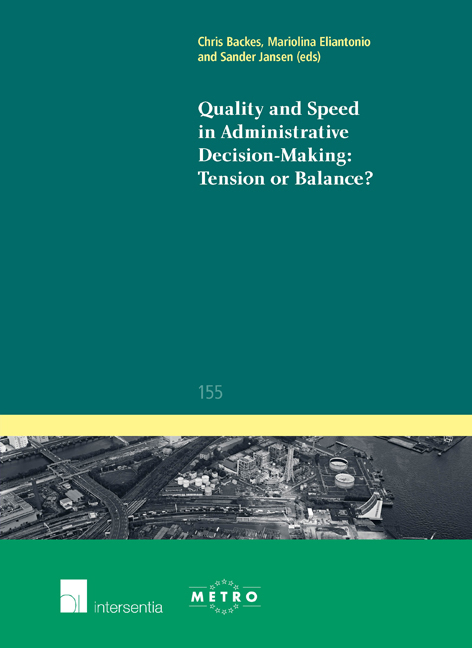Book contents
- Frontmatter
- Contents
- List of Authors
- List of Abbreviations
- Introduction
- Quality and Speed in Administrative Decision-Making: A German Case Study
- The Quest for Quality and Speed in Italian Administrative Law Or the Tale of some Elusive Targets
- Quality and Speed in Administrative Decision-Making: A French Case Study
- Planning for Major Infrastructure in England: Front-Loading Participation in the Interests of Efficiency
- Quality and speed in Judicial Procedures and Administrative Decision-Making: Environmental Permits in Sweden
- Faster and Better!? Decision-Making in the Netherlands
- Conclusions
- Ius Commune Europaeum
Conclusions
Published online by Cambridge University Press: 12 December 2017
- Frontmatter
- Contents
- List of Authors
- List of Abbreviations
- Introduction
- Quality and Speed in Administrative Decision-Making: A German Case Study
- The Quest for Quality and Speed in Italian Administrative Law Or the Tale of some Elusive Targets
- Quality and Speed in Administrative Decision-Making: A French Case Study
- Planning for Major Infrastructure in England: Front-Loading Participation in the Interests of Efficiency
- Quality and speed in Judicial Procedures and Administrative Decision-Making: Environmental Permits in Sweden
- Faster and Better!? Decision-Making in the Netherlands
- Conclusions
- Ius Commune Europaeum
Summary
Quality and Speed of Decision-Making – Some Introductory Remarks
For many EU and non-EU countries, speeding up administrative decision-making has been a prominent topic over the last decade. In Germany, mainly due to the needs of the reunification, this was already topical at the beginning of the 1990s. This book takes a closer look into the developments in some selected EU countries (Germany, France, UK, Sweden, Italy, and the Netherlands). It is striking that we could not identify a more fundamental discussion about the relationship between speeding up decision-making and the quality of decision-making in any of these countries. Or, otherwise put, the proposals (from politicians and governments) for speeding up decision-making do not really reflect the general discussions about quality of decision-making (in administrative science). As a result, it seems desirable to provide a few general remarks on what is needed for quality decisionmaking and on how quality and speed relate to each other before comparing any developments in these countries.
A Definition of Quality?
There is no common ground identifying a set of criteria for the quality of administrative decision-making. Whilst many scholars focus quality on the ‘right’ or legally correct outcome of decisions, others concentrate on the shift from a governmental authority to an efficient service unit, comparable to a commercial private enterprise. Focussing on the latter, quality management systems like ISO 9000 provide lists of criteria. However, these perceptions mainly concern the effective execution of decisions already taken and not the decision-making process itself. In other words, it concerns the operationalization of what was decided and not the way of determining what the administrative authorities should do. Besides legally correct decisions and efficient services, the democratic legitimacy of administrative decision-making is a third element of quality of administrative decisions. Accountability, transparency and participation of those affected are the key features to be dealt with concerning this third element.
The question of what constitutes quality of administrative decision-making and how it could be measured is also addressed in some of the contributions. Dubos points out that speed is relatively easy to measure, but that quality is not. Caranta suggests that a main element of quality of decision-making is effectiveness. After a certain policy aim has been identified and priorities between different aims have been made, the quality of decision-making could mainly be measured by determining the efficiency of the policy delivery.
- Type
- Chapter
- Information
- Publisher: IntersentiaPrint publication year: 2016



